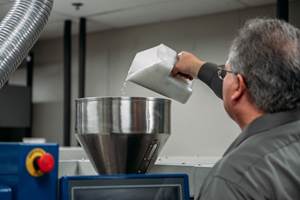Processors Wins Business Running Reclaim Nobody Else Wants
SelecTech’s business model is unique as a company involved in recycling, so too is its success.
SelecTech’s business model is unique as a company involved in recycling, so too is its success. Consider that the Taunton, Mass.-based processor has seen its sales increase by 80% or better each year since 1995, its second year in business. For 2000, SelecTech expects sales to climb to $4 million.
In a nutshell, SelecTech has built a business running reclaim nobody else wants. Part formulator/compounder, part custom injection molder, this processor develops high-end products from scrap supplied to it by a select group of companies, then sells these products through distributors.
Its largest and most-demanding product line is high-performance PVC-based industrial floor tiles, branded as RepTile and CrocoTile, and sold exclusively by DuPont Flooring Systems, Kennesaw, Ga. These molded 24 x 24 and 12 x 12 in. tiles interlock on all four sides like big, flat Lego pieces. They even come in Lego-like colors: bright green, medium blue, and gray. Because the pieces interlock, the flooring doesn’t have to be glued and can be installed over uneven subfloors.
The reclaim used in the process comes from carpet waste that DuPont installers pull up before they install new flooring. DuPont consolidates the vinyl-backed carpet with predominantly nylon-based face fiber, has the mixture shredded by a toll grinder, and then ships the fluff in gaylords to SelecTech. SelecTech formulated a compound for the mix that uses the nylon fiber as a composite in a flexible vinyl matrix (including a lot of post-industrial PVC as well).
Many recycling operations have failed over the past 10 years because their business model assumed they would be paid at least the disposal cost of removing problem waste. Not SelecTech. Instead, the processor pays for the waste plastic it molds. The price it pays for the scrapped carpet, for instance, covers DuPont’s cost of shredding and shipping, plus profit.
SelecTech has two other product lines: garden products and highway safety products. The garden line includes polyolefin-based flowerpots (branded Eco-Planter) for WorldWise Inc., San Raphael, Calif. They are molded to look like traditional clay pots, except they don’t break or crack.
Highway safety products include parking stops and lane dividers that feature molded-in metal inserts that bolt into the pavement. The lane dividers are manufactured for Qwick Kurb Inc., the U.S. licensee of Klemmfix Ltd. in Germany. Lane dividers are compounded out of PVC wire chip, which is likely to include shredded plastic, paper, a small amount of residual copper, and plenty of dirt. SelecTech converts this waste—dirt and all—into black mineral-filled compounds, then paints the dividers white.
This year, SelecTech developed a product that it’s selling on its own for the first time. It’s a square interlocking landscape timber made of polyolefins that’s available on a trial basis in five Home Depots in New England.
One key to SelecTech’s success is runnerless injection molding technology from a German supplier the processor would not identify. This low-pressure process works with a plunger in the barrel, allowing the barrel itself to function as a nozzle. It also permits processing highly contaminated plastic in granular form or fluff.
SelecTech’s production capacity has grown over the years. Now it operates four presses: three 200-ton machines and a 400-ton unit. It can make products on any of the four machines but dedicates certain products to specific presses to minimize tooling changes.
SelecTech most likely succeeds where so many other recyclers fail because its process is so streamlined. SelecTech goes directly from raw material to finished products, with no separation, cleaning, and pelletizing—and no middlemen—in between. “For a nanosecond, we considered making recycled compounds," recalls president Thomas Ricciardelli, "but decided up front we were better off making parts for other people.
Related Content
Coinjection Technology Showcases Recycled Material Containment
At Fakuma, an all-electric PXZ Multinject machine sandwiches a black core made of mechanically recycled PC/ABS within an outer layer made of chemically recycled ABS.
Read MoreMarket Changes Spur Industrial Recycler to Enhance Capabilities in Clear Plastic Reprocessing
Butler MacDonald found new business and flexibility thanks to a big step-up in purging efficiency.
Read MoreStar Plastics Achieves ISCC Plus Certification
West Virginia-based custom compounder adds to its sustainability credentials.
Read MoreExtrusion Technology Extended to Injection, Enabling Up to 100% Regrind Usage
Twin-barrel (shot-pot) press can handle more regrind, offers other benefits to molders.
Read MoreRead Next
Beyond Prototypes: 8 Ways the Plastics Industry Is Using 3D Printing
Plastics processors are finding applications for 3D printing around the plant and across the supply chain. Here are 8 examples to look for at NPE2024.
Read MoreLead the Conversation, Change the Conversation
Coverage of single-use plastics can be both misleading and demoralizing. Here are 10 tips for changing the perception of the plastics industry at your company and in your community.
Read More












